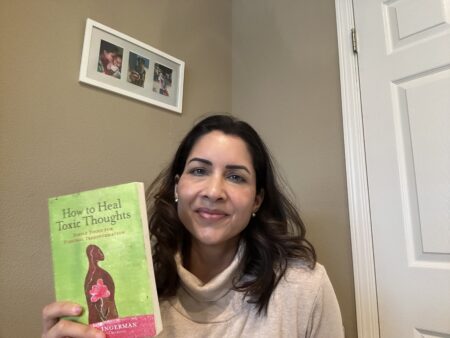“My parenting is joyless right now,” I say to her. I share with my therapist another failed attempt at getting my three kids under 11 years to school in a peaceful, organized and timely way. I was particularly defeated that day as a mother. So much so that I decided to post an Instagram video about my challenging morning. The post sparked lively, validating comments. They made me feel less alone. Though they didn’t address the solution for this paradigm of parenting I was in: the task-master mom.
“I move from morning ‘jobs’ to bedtime routines and break up sibling fights in between. I’m not seeing the fun in this,” I say in a defeated tone. The weight of being a single parent adds to my heaviness.
“I know one day I will regret not savoring these moments. I just don’t know HOW to do it differently,” I say, then sigh into silence.

Recognizing Old Patterns
“What was the parenting approach you grew up with and how did it make you feel as a child?” my therapist asks directly.
It was a simple question but crucial one for me as a parent to answer. Growing up in an immigrant household, obedience, hard work and earning my rest was the basis of childhood. I knew I had to always be busy, contributing to the household or studying. As an adult, I understand my parents more, their “why” and have empathy for their circumstances.
It was a childhood based on “performance-based validation.” If I “do,” then I am praised. If I do not “do,” then I am failing. Thus, I should always be doing, I learned. Add this to perfectionistic tendencies, and there is no place to rest. There is only room to do more.
“It was unsettling at times, but I knew no other way. I understand it came from a good place,” I add.
There are benefits to this approach. I had (generally) good grades, received admissions to good schools and have a solid career because of the independence, work ethic and determination my parents helped cultivate. The downside: there is no end to the pursuit. I personally struggle with doing enough and never feel I reach that point of satisfaction — perfection. It has led to many achievements but with hustle and strife as the pathway.
I want to parent differently. I have to with my children. My life circumstances are also very different than my parents’ was, as well. Yet, the opposite, laissez-faire approach doesn’t seem a solution. I want a little of both – to drop out of certain parts of the rat race to enjoy life more while living, parenting and working with excellence. So, how to shift?
Ushering in a personal paradigm shift
Though I have taken many parenting classes and read all the parenting best-sellers, I love ticking off items on my checklist. It drives my life and my parenting.
30+ items on never-ending repeat, like: brushing teeth, making beds, using kind words, prepping snacks, picking up trash and getting kids to bathe — with soap! Add this to my personal and career tasks, and the day is a race to the bottom of a never-ending list that simply racks up the next day.
“I can’t give up on doing home working and cooking dinner. There are parts of life that are mandatory. I am an organized person. I can’t change certain parts of me. So, how do I shift?” I ask.
“By starting small and where you can,” my therapist shares. “With perfectionistic tendencies all areas in life are charged with an all-or-nothing intensity. Everything feels important, but rarely that’s true. Don’t give up your core values and efforts. Instead, see what areas can have less intensity.”
That advice made sense and was easily actionable. It gave me space to teach my child the value and importance of making his bed, for example, but the space to let go of evaluating whether it was a a good-enough effort or not. I could save that for when guests come over and make it a weekday task, for example.
She suggests I go through my day, writing down every parenting task in a day. Once an exhaustive list is made, I can understand my values and prioritize my energy. Here’s an example of how I made this a quantative exercise:
| Task | Value | My participation/effort level for compliance (0-3) | Importance (0-3) | Level of work it creates if no cooperation? (0-3) |
| Brushing teeth | Hygiene | 3 | 3 | 0 impact, though future cost/time with dentist |
| Making lunches | Independence | 3 | 1 | 1 I have to do food prep anyhow, so I do fruits and veggies and they do snacks |
| Making bed | Discipline | 2 | 2 | 0 just irritation, skip on weekends |
| Saying prayers | Spirituality | 1 | 3 | 0 impact, can do it in the car |
By laying these things out, I begin to get a sense for why certain chores are charged for me, their importance and where I can create ease. What I am learning to match up more closely is putting my effort into high value-oriented tasks and easing on the rest. Getting to the 55%.
Also a factor, how much work it creates for me when they don’t do the chore. When they help me on trash day, the task is completed in 3 not 10-15 minutes. It is also a task that is highly charged for me. When I get help with it, I feel supported. By understanding these things, I can prioritize items and learn to ease on others. I’m ensuring I keep the bar high on the valuable tasks while lowering the rest.
When can good enough actually be good enough?
I discuss the opportunity the pandemic provide to rewrite the rules for ourselves as women at work and home
Another challenge many women I know have difficulty with is learning how to be satisfied with “good enough” outcomes. A girlfriend of mine and I have a running joke since the pandemic: “Getting 55% of what you want is killin’ it these days.”
Successful, high performing women have often achieved success by giving 100% – even 110% – to our efforts. This applies to working out, our careers or even our dating lives. It feels out of our comfort zones to operate in a world where imperfect outcomes and efforts less than “all out” are acceptable.
One of the biggest gifts of the pandemic has been a forced lowered bar for ALL women. I talk in this in the video above, the gift of being able to rewrite the rules for ourselves. As mothers and wives, we have been living to survive and stay healthy or sane! We all served our own version of cereal for dinner, let go of screen time limits and embraced a messy house. We learned to appreciate even a half-achieved to-do list. Getting 55% of what we wanted done in a day was success. I wrote about my experience lowering hurdles for myself, as well. Holding onto this realistic approach as a mother is part of my evolving work as the pandemic wanes. A lower bar is easier to clear.
Measuring progress
Those with perfectionistic tendencies struggle with measuring progress even if the target is easier to hit. It can feel absolute, black or white. “Measure progress, not perfect,” my therapist urges me. It is easy to measure progress as: if I arrive at school on time without any fights with all tasks done without me asking, then I’m successful.
But how likely is that to happen? That’s expecting perfection.
Changing and shifting happens more gradually and subtly. Just as we can’t expect to lose 10 pounds in a week, we have to take a more gradual approach with personal paradigm shifting. It serves us more to measure our progress by movements after the decimal point. Our subtle, fractional changes should be acknowledged as a win.
Look for them.
Did you shift out of yelling faster than you normal? WIN. Did the kids do something without asking? WIN. Did you make it to school on time? WIN. Did the kids do 3 things great this morning? WIN. Did you drop a fight when normally you wouldn’t have? WIN.
Seeing our wins is crucial in shifting our habits. It creates new grooves and positive chemicals in our brain and makes us feel successful. Happier! In a way it is like any gratitude practice you may have. The more you notice changes and see even small successes around you, the more positive you feel about yourself. You create positive energy around a stressful issue, diminishing its impact on you. Feeling successful and masterful creates contentment and joy.
My therapists ends our session reminding me that, “If you are better at this than you were before, then that’s progress. Celebrate it.” I have to anticipate a backseat fight that will require me pulling over to solve. I should expect a few more tardy mornings. But, as I shift my parenting to what’s important, I change patterns. In this, I empower myself and create small moments of joy for both me and my children – and, ultimately, that is the life I want all of us to have.



